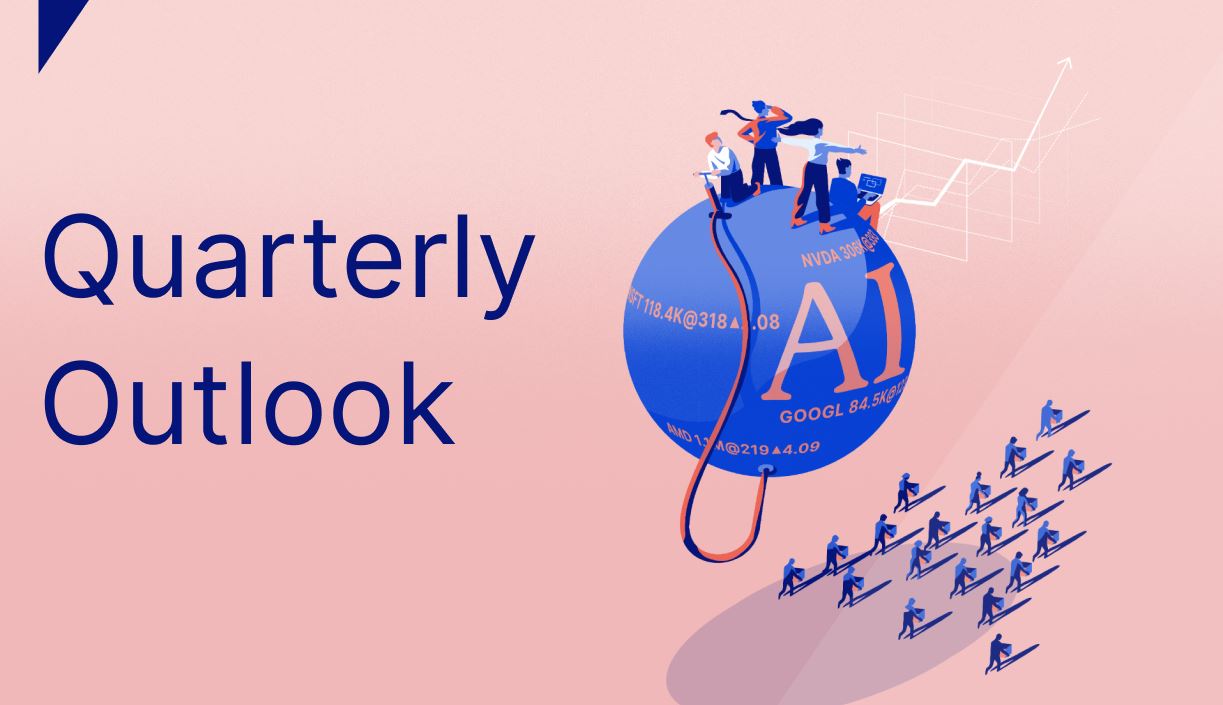Saxo Q3 Outlook: AI – The Good, the Bad and the Bubble

Saxo, the online trading and investment specialist, has today published its Q3 2023 Quarterly Outlook for global markets, including trading ideas covering equities, FX, currencies, commodities and bonds, as well as a range of central macro themes impacting client portfolios.
The advent of new technologies impacts both positively and negatively on society, and this is no different for artificial intelligence (AI) – which has taken the world by storm over the past several months. In turn, Saxo’s Q3 Outlook takes a closer look at the current market impact of the AI theme across markets and around the world.
While Chief Investment Officer, Steen Jakobsen, admits there is “potential for generative AI to increase productivity over time”, he warns that “the market is getting ahead of itself in selecting winners, and current valuations are already discounting too much of the longer-term future gains to be had.”
On the broader macroeconomic backdrop, Jakobsen says market participants are making a mistake in believing that the current market cycle will play out like previous ones.
“After the COVID-19 pandemic, many people believe that the economy is returning to a normal path. They believe that low interest rates will continue to support growth and that a “soft landing” is possible. However, this view is naïve.”
“The economy is currently loaded with excess debt and asset valuations are at all-time highs,” he adds. “A soft landing is very unlikely in this environment and, as an economic concept, is extremely rare.”
According to Damian Hitchen, CEO, Saxo Bank MENA, “while the Middle East’s outlook is largely expected to expose the regional markets to a mix of opportunities and challenges, we are also likely to witness major energy exporters like Saudi Arabia and the United Arab Emirates reap benefits from favourable energy market conditions and investment projects. On the other hand, net energy importers may continue to face financial pressures to a large extent. The region’s economic growth rates are expected to be moderate but positive and remain relatively robust. This will be, for the most part, fuelled by energy market conditions, ongoing investment projects, and non-energy exports. Potential regional headwinds to the levels of growth include inflation, high-interest rates, and geopolitical uncertainty.
The AI fever pushes market to new extremes
Earlier this year, markets were anticipating the economy to crumble, but the emergence of advanced AI systems has proved to be a game-changer, says Saxo’s Head of Equity Strategy, Peter Garnry.
The AI-hyped rally has pushed the US equity market to new extremes, while interest in AI-adjacent industries has also intensified. Saxo’s semiconductor theme basket was up 39.8% by mid-June, while its AI theme is its most accessed equity research.
One of the main questions for global investors remains whether to reduce exposure to equities. However, “if the investor wants to maximise long-term wealth, an overweight exposure to equities is still the most prudent”, says Garnry.
Is AI the new crypto?
Mads Eberhardt, Cryptocurrency Analyst at Saxo, takes a closer look at the AI fever that has overtaken markets: “we see remarkable similarities between crypto and the recent rise of AI, including the seemingly one-way street of capital flowing to everything AI.”
Retail investors, in particular, will continue turning their attention to the theme, as they “enjoy markets with greater risk/reward, similar to crypto and meme stocks, in which retail investors are highly dominant.”
However, “the market will eventually reassess its projection of the near-term impact of AI, as the technology matures more slowly than expected and other challenges become evident, including regulatory uncertainty, which AI, like crypto, is likely to suffer from.”
Artificial Intelligence, a promising game-changer for the portfolio?
Saxo Investment Coach, Hans Oudshoorn, outlines how investors can gain exposure to AI via ETFs that provide considerable diversification.
One way to get exposure to AI is through the ‘Magnificent Seven’ – Amazon, Alphabet (Google), Apple, Meta, Microsoft, Nvidia, and Tesla. “These companies all play a key role in the development and application of AI, but it is worth remembering that the key driver of their earnings is still not AI.” However, “investors should also recognise that investing in individual stocks is generally riskier than diversified investing through a mutual fund or ETF.”
“Growth expectations are very high for these companies which means that the upcoming Q2 earnings season poses a key test of those expectations. Most of the AI-related companies are US-based and thus there is a considerable USD risk in this theme.”
The USD smile and the JPY dam break
In currencies, Head of FX Strategy at Saxo, John Hardy, notes that USD shorts could be set for a nasty reality check if the US economy remains resilient and core inflation remains sticky, possibly engaging both sides of the “USD smile” that drive USD strength.
“The banking turmoil was a milestone pointing in the direction of further tightening on credit that will eventually lead to an economic slowdown, but it looks like “eventually” will prove much further over the horizon than we anticipated.”
“In Q3, our belief is that markets are overconfident in benign outcomes for inflation and therefore for central bank policy. This could engage either or even both sides of the USD smile. With global risk sentiment in near euphoria as of late Q2, we are watching the 10-year US Treasury benchmark, which would threaten a reality check and boost the USD as well on a move to new cycle highs.”
Commodity market focus: Bottoming out?
Ole Hansen, Head of Commodity Strategy at Saxo, suggests that the sector looks set to start the third quarter on a firmer footing after months of weakness saw a partial reversal during June.
“Despite continued demand worries led by recession concerns in the United States and Europe, the energy sector is holding up – supported by Saudi Arabia’s unilateral production cut, rising refinery margins into the peak summer demand season and speculative traders’ and investors’ belief in higher prices being near the weakest in more than ten years, thereby reducing the risk of additional aggressive macroeconomic-related selling.”
Ole notes that strong gains were at times driven by a weaker US dollar, but specific developments in each sector also weighed. Most concerning is the risk of higher food prices into the autumn, as several key growing regions battle with hot and dry weather conditions sparked by the first El Niño weather pattern in years.
“From the recent price performance across the different sectors, we could be seeing the first signs of markets bottoming out, with current levels already pricing in some of the worst-case growth scenarios.”
To hike or not to hike, that is the question.
Saxo Senior Fixed Income Strategist, Althea Spinozzi, tackles the dilemma currently facing central banks: are they willing to burst the asset bubbles created by a decade of Quantitative Easing and trigger a recession to win the inflation fight?
Looking ahead, “it is safe to expect that the tightening cycle will come to an end in the second half of the year as additional interest rate hikes than those expected by markets would further invert yield curves rather than have a significant impact on inflation.”
Given this backdrop, what should investors consider? “As we enter a volatile environment, balancing duration and credit risk will be pivotal. Moreover, as uncertainty keeps volatility in bond markets elevated, our preference is to keep duration at a minimum.”
Last Updated on 1 year by News Desk 2












